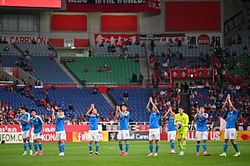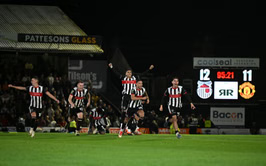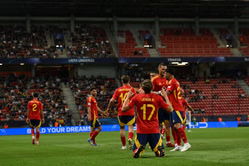The Jeonju World Cup Stadium, also known as “Fort Jeonju”, is a football stadium located in Jeonju, South Korea. The Jeonbuk Hyundai Motors use this stadium as their home. The stadium has a capacity of 42,477 and was built in 2001.
The stadium is operated by the Jeonju City Facilities Management Corporation and represents the beauty of South Korean design. The stadium occupies a massive area and is the perfect home stadium for any club.
The pitch is of natural grass and the stadium is owned by the city of Jeonju itself, constructed at a cost of 133.3 billion Won.
![]()
History
The construction of the Jeonju Stadium was started February 19, 1999 and was completed in a span of less than two years. The opening was on November 8, 2001 and was presided by President Kim dae-jung.
The stadium was mainly constructed for the 2002 FIFA World Cup, with a capacity of about 42,000. The stadium has a unique design that was taken from the South Korean tradition, a fan known as Hapjukseon in Korean.
Major Matches
The stadium hosted three matches during the 2002 FIFA World Cup - two group-stage matches and one round of 16 match. The first match featured Spain going up against Paraguay in a Group B match. Spain won the match 3-1. The other group stage game was between Portugal and Poland, where Poland were demolished by a superb Portugal by 4 goals to nil.
Longtime rivals USA and Mexico went head to head in the round of 16 match held here. USA blew Mexico away by a two-goal margin, the match ending 2-0.
The stadium also hosted the 2011 AFC Champions League Final, even though the venue draw was at random. The final witnessed a match between Jeonbuk and Al-Sadd.
Recent Matches
The stadium is now the home of South Korean giants Jeonbuk Hyundai Motors where they compete in the K-League. The club, which was founded in 1993, played their recent match against Suwon Bluewings in the last match of the league. They lost the match 3-2, but still won the title with 75 points from all the 38 games.









